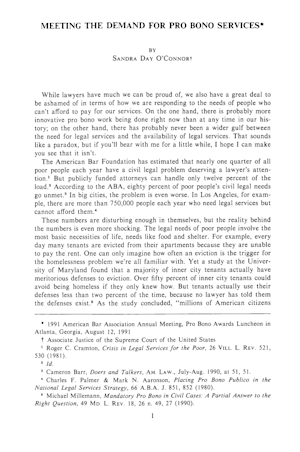By Justice Sandra Day O'Connor
Meeting the Demand for Pro Bono Services
August 12, 1991

DISCLAIMER: This text has been transcribed automatically and may contain substantial inaccuracies due to the limitations of automatic transcription technology. This transcript is intended only to make the content of this document more easily discoverable and searchable. If you would like to quote the exact text of this document in any piece of work or research, please view the original using the link above and gather your quote directly from the source. The Sandra Day O'Connor Institute does not warrant, represent, or guarantee in any way that the text below is accurate.
Article Text
(Excerpt, Automatically generated)
MEETING THE DEMAND FOR PRO BONO SERVICES*
BY
SANDRA DAY O'CONNOR†
While lawyers have much we can be proud of, we also have a great deal to be ashamed of in terms of how we are responding to the needs of people who can't afford to pay for our services. On the one hand, there is probably more innovative pro bono work being done right now than at any time in our history; on the other hand, there has probably never been a wider gulf between the need for legal services and the availability of legal services. That sounds like a paradox, but if you'll bear with me for a little while, I hope I can make you see that it isn't.
The American Bar Foundation has estimated that nearly one quarter of all poor people each year have a civil legal problem deserving a lawyer's attention.1 But publicly funded attorneys can handle only twelve percent of the load.2 According to the ABA, eighty percent of poor people's civil legal needs go unmet.3 In big cities, the problem is even worse. In Los Angeles, for example, there are more than 750,000 people each year who need legal services but cannot afford them.•
These numbers are disturbing enough in themselves, but the reality behind the numbers is even more shocking. The legal needs of poor people involve the most basic necessities of life, needs like food and shelter. For example, every day many tenants are evicted from their apartments because they are unable to pay the rent. One can only imagine how often an eviction is the trigger for the homelessnes
